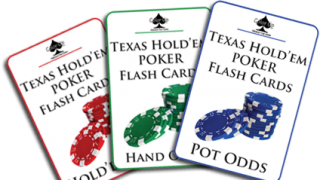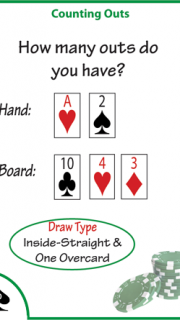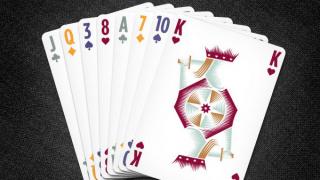Major corporations sell cards, chips and tables to poker players around the world. Online poker sites rake in millions from online grinders.
It’s a multi-billion dollar industry.
Poker is also small business, however.
There are hundreds of small poker businesses that do limited runs of nearly every poker product you could imagine.
Recently there’s been a growing trend of individuals using crowd-sourcing platforms like Kickstarter, Indiegogo and Rockethub to generate funding and then create poker items you won’t find anywhere else.
Sandy Metivier is one such individual.
The 32 year-old is the creater of Color Up Flash Cards, a unique set of training cards that help new players improve their poker game. She’s currently running a campaign on Indiegogo to help upgrade the company’s online presence.
An Elementary School social worker by day, Metivier loved to play poker with her friends on the weekend.
After playing the game for a couple years Metivier felt her skills had leveled off. She wanted to get better so she picked up a couple books but struggled to get through them because she was a hands-on learner.
Services Like Indiegogo Can Help Turn a Good Idea into Reality
Clik here to view.

What Metivier really wanted were poker flash cards. That product didn’t exist, however, and that’s what inspired her to create Color Up Flash Cards.
“I taught myself everything I needed to make the products - Color Up is definitely my baby,” she said.
“I learned Adobe Illustrator to do all the design and layouts. I learned the math to come up with the formulas and scenarios, and consulted with advanced players to make sure that I was providing the correct odds and information.”
Metivier created three different decks of cards including Hold’em 101, Hand Odds and Pot Odds and started selling them on her website. Reviews were very positive and well-known poker pro Vanessa Selbst Tweeted an endorsement of the cards.
Metivier still wanted to raise the profile of the business, however, and crowd-funding seemed like a viable option. She narrowed her two choices down to Indiegogo and Kickstarter.
Clik here to view.

Eventually she went with Indiegogo thanks to its “Take what I can get” approach versus Kickstarter’s “All or nothing.”
“Now that we've had some success, I want to improve our reach online, and that takes more money to pay someone who is an expert at SEO,” she explained.
“To do that I need $8,000 at once, and an Indiegogo campaign seemed like the perfect way to raise the funds in one chunk, spread the word about my business, and leverage the support of people I already knew would probably help me out.”
The Color Up Cards Campaign has already earned $2,000 towards its goal but has a ways to go before it hits $8,000.
Tough Choices for CEOs Looking to Crowd-Fund
Clik here to view.

Mitivier admitted that services like Indiegogo are not without their challenges.
“It's not an easy thing to crowd-fund,” she said.
“You don't just throw your campaign out there and wait for the bucks to roll in. It actually takes a ton of hard work, from contacting people to constantly updating your Facebook and Twitter, plus making the campaign appealing through perks, updates, and clever marketing.”
Mitivier went on to say that it’s a huge time commitment and with more and more people turning to crowd-funding, there is a high degree of competition.
“What makes our campaign a bit unique is that people love to feel that they are part of starting something, and Color Up has already started - we have our product, we have sales, we just need capital to grow,” she said.
Mitivier has big plans for Color Up in the future with more decks, expansion to brick and mortar stores and eventually she wants expand the flash cards to include games beyond poker.
Kickstarter Offers Potentially Bigger Reward but Higher Risk
Clik here to view.

Kickstarter is the other giant in the crowd-funding world and several notable products have been created through the site including Vända playing cards, +EV Poker Comics and even a video documentary about poker called Drawing Dead.
James Simpson, the founder of GoldFire Studios in Oklahoma, successfully funded a poker-centric video game titled CasinoRPG through Kickstarter.
Previously Simpson had created PokerRPG but he needed a little extra support to produce CasinoRPG. He turned to Kickstarter.
Clik here to view.

“Kickstarter is an incredible platform that I've been using personally to back games and other projects for almost 2 years now,” said James Simpson.
“It certainly has been humbling to see people putting in their hard-earned money for a game they haven't even played yet.”
Unlike Indiegogo, Kickstarter does not pay anything if organizers fail to meet their goal, so in some ways, it’s a riskier proposition.
Simpson warned it’s not something to take lightly.
“The main takeaway I've gotten from the experience of running a Kickstarter campaign is that it can be extremely rewarding, but what you get out of it is proportionate to the work you put in,” he said.
“We spent over a month just preparing for the launch, and a majority of my time since the Kickstarter launch has been spent promoting and maintaining the campaign.”
It’s obviously not just the creators who benefit from running crowd-funded projects.
In most instances contributors receive products that are infinitely more unique than something you’d find at Wal-Mart or Target.
Crowd-Funding Gives Small Businesses a Shot at the Big Time
David Goldklang, a 33-year-old graphic designer from California, successfully funded a striking set of cards called Vanda that have received rave reviews.
Clik here to view.

Vanda went so well that Goldklang recently ran another campaign, this time for Polaris cards, which easily surpassed the goal of making $15,000 by eventually raising $45,660.
The sky now seems to be the limit for the Vanda Playing Card Company. It’s unlikely that would be possible without Kickstarter.
“I’ve shown the design around several large card rooms and everyone loved the look of the cards and wanted to know how they could get a few decks,” said Goldklang.
The overwhelming message from crowd-funding small businesses seems to be that if you have a killer idea for a poker product, and you’re willing to put in the work, almost anything is possible.
In some ways using services like Kickstarter and Indiegogo is like selling action in a big poker game.
Normally you couldn’t even play in the game but, thanks to your backers, if you make a big score (i.e. a good product) everyone wins.
Visit www.pokerlistings.com